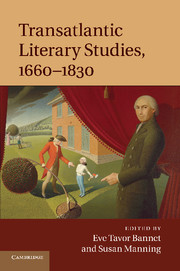Book contents
- Frontmatter
- Contents
- Notes on contributors
- Acknowledgements
- Introduction: British and American genres
- Chapter 1 Transatlantic books and literary culture
- Chapter 2 Transatlantic utopianism and the writing of America
- Chapter 3 Tales of wonder, spiritual autobiographies, and providence tales
- Chapter 4 Life writings
- Chapter 5 Benjamin Franklin and transatlantic literary journalism
- Chapter 6 Theatre, drama, performance
- Chapter 7 Transatlantic American Indians
- Chapter 8 Literature of the ocean
- Chapter 9 “To gird this watery globe”
- Chapter 10 Ghostly and vernacular presences in the black Atlantic
- Chapter 11 Susanna Rowson and the transatlantic captivity narrative
- Chapter 12 Domestic fiction and the reprint trade
- Chapter 13 Transatlantic Gothic
- Chapter 14 Transatlantic Romanticisms
- Chapter 15 Journeys of the imagination in Wheatley and Coleridge
- Chapter 16 Transatlantic historical fiction
- Further reading
- Index
- References
Chapter 4 - Life writings
Published online by Cambridge University Press: 05 January 2012
- Frontmatter
- Contents
- Notes on contributors
- Acknowledgements
- Introduction: British and American genres
- Chapter 1 Transatlantic books and literary culture
- Chapter 2 Transatlantic utopianism and the writing of America
- Chapter 3 Tales of wonder, spiritual autobiographies, and providence tales
- Chapter 4 Life writings
- Chapter 5 Benjamin Franklin and transatlantic literary journalism
- Chapter 6 Theatre, drama, performance
- Chapter 7 Transatlantic American Indians
- Chapter 8 Literature of the ocean
- Chapter 9 “To gird this watery globe”
- Chapter 10 Ghostly and vernacular presences in the black Atlantic
- Chapter 11 Susanna Rowson and the transatlantic captivity narrative
- Chapter 12 Domestic fiction and the reprint trade
- Chapter 13 Transatlantic Gothic
- Chapter 14 Transatlantic Romanticisms
- Chapter 15 Journeys of the imagination in Wheatley and Coleridge
- Chapter 16 Transatlantic historical fiction
- Further reading
- Index
- References
Summary
Writing about the self and writings about notable figures have long been the focus of life writings. Donald Winslow, for example, provides this definition of the term “life-writing”: “In the narrower sense this term means biography, but in general it may include autobiography as well, so that it is actually a more inclusive term than biography, even though some people may consider the word biography to include autobiographical works, letters, diaries, and the like. Life-writing has been used since the eighteenth century, although it has never been as widely current as biography and autobiography since these words came into the language.” When applied to transatlantic literary studies from 1680 to 1830, in particular, the term also includes the personal narrative, such as the spiritual, captivity, slave, and travel narrative, and works as disparate as Mary Rowlandson's captivity narrative The Soveraignty and Goodness of God (1682), Samuel Sewall's Diary (1674–1729), Cotton Mather's Diary (1681–1724), Sarah Kemble Knight's Journal (1704), William Byrd's Diaries (1709–41), Lady Mary Wortley Montagu's Letters (1709–62), Jonathan Edwards's Personal Narrative (c. 1740), Elizabeth Ashbridge's Account (1755), Samson Occom's “A Short Narrative of My Life” (1768), John Woolman's Journal (1774), Andrew Burnaby's Travels…1759 and 1760 (1775), Elizabeth House Trist's Travel Diary (1784--5), Samuel Johnson's Letters (1731–84), Olaudah Equiano's Interesting Narrative (1789), and Benjamin Franklin's Autobiography (1791).
Life writings convey news, record observations, or relay experience, and may be addressed to a single recipient or to a larger, more public audience. Whether in manuscript or print, they have a unique eyewitness quality that differs from an official report or a historical overview. As the writer retells a life's event or relates a story, there is a compelling sense of learning about the past as it unfolds in real time. Life writings thus document individual responses to a contemporary world. Family members send news of births, marriages, and deaths, along with updates on health, crops, and activities, which collectively preserve family histories. Spiritual aspirants recount emotional struggles towards conversion. Travelers describe roads, accommodations, and towns, which then aids other travelers. Captives tell of their strategies for survival. Slaves testify to the indignities of slavery and inspire a movement towards abolition. Whether from the actual sharing of life writings across the Atlantic (as with a letter or a travel account) or from their content (as in a diary, autobiography, or personal narrative), life writings clearly enhance transatlantic literary studies. This chapter will discuss the ways in which life writings were read and used, describe the influence of technology on distribution, draw attention to the existence and role of manuscript publication, and, overall, demonstrate the impact of life writings in the Atlantic world.
- Type
- Chapter
- Information
- Transatlantic Literary Studies, 1660–1830 , pp. 60 - 74Publisher: Cambridge University PressPrint publication year: 2011



